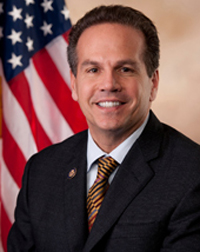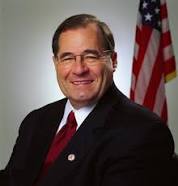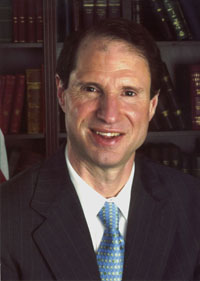
WASHINGTON, DC (SDJA) – The House of Representatives on Thursday, May 22, by a vote of 301-121 the USA FREEDOM Act to reform our nation’s intelligence gathering programs, including ending bulk data collection. While the bill passed by a lopsided margin, many members of Congress said even stronger protections against government snooping are necessary. From Jewish members of the House of Representatives and the U.S. Senate, there were these comments:
U.S. Congressman David N. Cicilline (D-Rhode Island), a member of the U.S. House of Representatives Judiciary Committee,“The bulk collection of phone records of millions of Americans violates well-established and long standing principles of privacy. Today’s vote ends the practice of bulk collection by the National Security Agency, improves transparency, and establishes judicial review with appropriate standards for government collection of information.”

U.S. Rep. Jerrold Nadler, D-New York, said in debate leading up to the vote:
“Today we have the first chance in more than a decade to finally place some real limits on the sweeping, unwarranted – and at times unlawful – government surveillance that many of us have fought against for the past several years.
“First and foremost – and as the Administration acknowledges in its Statement of Administration Policy – this bill will end bulk collection under Section 215 of the USA PATRIOT Act, and will ensure that the government is also prohibited from using its national security letter authority, or pen registers and trap and trace devices, for bulk collection. It does so by requiring the government to identify a ‘specific selection term’ – something like a person’s name or an account or telephone number – as the basis for obtaining information. This term must limit the scope of records collected to those that are ‘relevant’ to an authorized investigation, which requires a reasonable relationship between the records and the subjects of a terrorism investigation.
“I share the concerns that the current definition of ‘specific selection term’ may still allow overbroad collection. But given the ‘presumptively relevant’ categories that Congress has already identified in Section 215 – and because the bill will now require participation of an amicus in the FISA (Foreign Intelligence Security Act) court who can argue against an overly broad reading of the law – the government would not be permitted to, for example, use an entire telephone area code or an Internet router to collect and warehouse records just because a terror suspect might be using a phone in that area code or sending communications that might traverse that router. Moreover, to the extent the FISA Court ever construes a ‘specific selection term’ this broadly, other reforms in the bill ensure that Congress and the American people would know about it immediately.
“These changes are significant, as are the new restrictions to the use of FISA Section 702, which allows the NSA to target persons located outside the United States.
“The USA Freedom Act on the floor today certainly does not give us everything we want or need. It is the product of heated negotiations across party and Committee lines and with the intelligence community. It is far from perfect, but it is an important step forward and we will work to fix remaining problems and strengthen the bill as it moves through the Senate. But a ‘no’ vote on this bill may mean no reform at all, thus leaving in place the framework that led to the dragnet surveillance of our citizens. This bill makes critically important changes that we all should support. That is why I will vote for it, and I urge all of you to do the same. ”

Rep. Adam Schiff (D-California) said following the vote: “The passage of today’s bill puts the Congress on track to end the bulk collection of American’s telephone records and implements reforms to surveillance authorities to protect privacy and increase transparency.
“For a long time, I have urged that the telephone metadata program should end in favor of a system in which telecommunications providers retain their own records so they can be queried based on a court approved reasonable articulable suspicion standard. That’s precisely what this bill puts in place. It allows us to keep the capabilities we need to protect the nation from terrorist plots, while protecting privacy and civil liberties.
“There are remaining ways that this bill can be improved, and I hope that as it heads to the Senate there are opportunities to do so. It is my hope that provisions to introduce an adversarial process in the FISA Court will be included by the Senate. The FISA Court, and public trust, would benefit from an independent advocate who could represent the privacy interests of the American people in the limited number of cases that call for significant statutory interpretation or present novel issues. I hope that the Senate will incorporate these provisions, which would be both wise and constitutionally sound.”
Schiff noted that he has introduced several pieces of reform legislation in addition to proposing changes to the phone metadata program. First, Schiff introduced the Telephone Metadata Reform Act, which would restructure the telephone metadata program by specifically removing call records from the types of information the Government can obtain under Section 215 of the PATRIOT Act. Instead, records would be obtained on a case by case basis from the telephone companies subject to approval by the Foreign Intelligence Surveillance Court. Second, Schiff introduced the “Ending Secret Law Act” which would require the Attorney General to declassify significant Foreign Intelligence Surveillance Court (FISC) opinions, allowing Americans to know how the Court has interpreted the legal authorities created under Section 215 of the PATRIOT Act and Section 702 of the FISA Amendments Act. Third, Schiff introduced legislation to require that the 11 judges on the Foreign Intelligence Surveillance Court (FISC) be nominated by the President and confirmed by the Senate. Finally, Schiff introduced legislation to require the Privacy and Civil Liberties Board to create a pool of attorneys with experience in Fourth Amendment or national security law to argue the side of the public when the government requests a surveillance warrant in the FISA Court.
*

U.S. Senator Ron Wyden (D-Oregon), issued this statement: “ “I am gravely concerned that the changes that have been made to the House version of this bill have watered it down so far that it fails to protect Americans from suspicionless mass surveillance. The new text of the bill states that the government must use a ‘selection term’ to collect Americans’ records, but the bill’s definition of a ‘selection term’ is so vague that it could be used to collect all of the phone records in a particular area code, or all of the credit card records from a particular state.
“While this bill’s authors may not intend for it to be interpreted so broadly, the Executive Branch’s long track record of secretly interpreting surveillance laws in incredibly broad ways makes it clear that vague language is ineffective in restraining the Executive Branch. Given the Executive Branch’s record of consistently making inaccurate public statements about these laws in order to conceal ongoing dragnet surveillance of Americans, it would be naïve to trust the Executive Branch to apply new surveillance laws with restraint.
“It is unfortunately clear that some of the same officials who were responsible for conducting this dragnet surveillance and misleading the public about it are now working to make sure that any attempt at reform legislation is as limited as possible.
“Fortunately, the Senate version of the USA Freedom Act still contains a strong prohibition against bulk collection, as well as a number of other important reforms. In particular, it would close the ‘back-door searches’ loophole that allows intelligence agencies to deliberately read Americans’ emails without a warrant, and it would reform the Foreign Intelligence Surveillance Court and install an advocate to argue for Americans’ constitutional rights when that court is considering major questions of law. While I must oppose the House-passed version of the USA Freedom Act, I will continue to work with my colleagues to advance the Senate version of this legislation, and deliver the comprehensive reforms that the American people deserve.”
*
Preceding provided by U.S. Reps David Cicilline, Jerrold Nadler, Adam Schiff and U.S. Senator Ron Wyden.